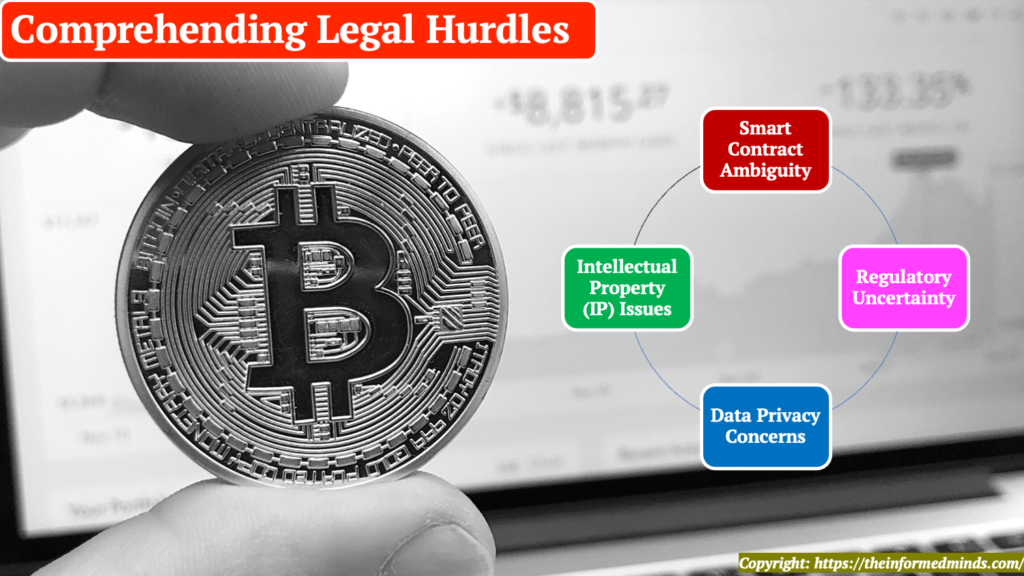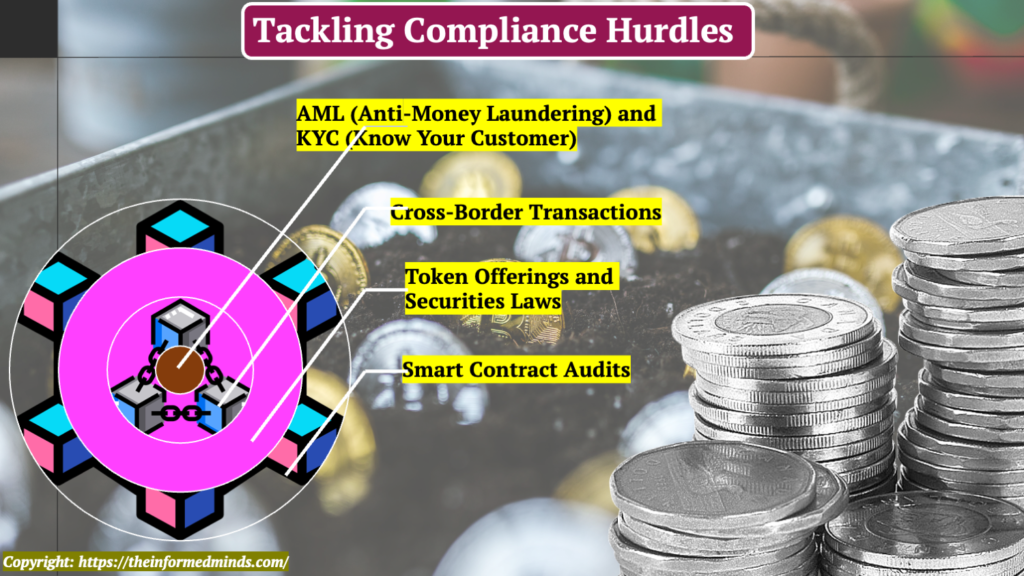To Share is to Show You Care!
In the dynamic realm of blockchain technology, where innovation converges with decentralized networks, businesses face a myriad of legal and compliance challenges. As organizations harness the power of blockchain for streamlined operations, transparency, and enhanced security, it becomes crucial to navigate the complex legal landscape. This blog post explores key solutions to address legal and compliance challenges in the blockchain space.
1. Understanding Legal Challenges

1.1 Smart Contract Ambiguity
- Implement standardized smart contract templates: Utilize established templates that have been legally reviewed and accepted within the industry. This helps reduce ambiguity and ensures consistency in smart contract language.
- Engage legal experts: Work with legal professionals specializing in blockchain to draft clear and comprehensive smart contract terms, minimizing the risk of disputes.
1.2 Regulatory Uncertainty
- Stay informed about evolving regulations: Regularly monitor regulatory developments in the blockchain space to adapt quickly to changing requirements.
- Establish proactive communication: Engage in open dialogue with regulatory bodies to gain clarity on compliance expectations. Actively participate in public consultations and comment periods to influence regulatory outcomes.
- Collaborate with industry associations: Join and actively participate in blockchain industry associations to collectively advocate for favorable regulations that support innovation.
1.3 Data Privacy Concerns
- Utilize privacy-focused solutions: Implement blockchain solutions designed with privacy in mind, such as zero-knowledge proofs or privacy coins.
- Implement encryption and data anonymization: Enhance data security by employing encryption and anonymization techniques within the blockchain infrastructure.
- Comply with data protection regulations: Ensure compliance with data protection laws, such as GDPR, by incorporating necessary safeguards and obtaining user consent for data processing.
1.4 Intellectual Property (IP) Issues
- Register blockchain-related patents and trademarks: Protect intellectual property assets by registering patents and trademarks related to blockchain innovations.
- Conduct IP due diligence: Before entering partnerships or collaborations, conduct thorough due diligence to identify and address any potential intellectual property conflicts.
2. Addressing Compliance Challenges

2.1 AML (Anti-Money Laundering) and KYC (Know Your Customer)
- Integrate AML and KYC protocols: Embed AML and KYC procedures directly into blockchain processes to ensure compliance with financial regulations.
- Collaborate with third-party providers: Engage reputable third-party providers specializing in compliance services to enhance the effectiveness of AML and KYC measures.
2.2 Cross-Border Transactions
- Understand and comply with international regulations: Gain a comprehensive understanding of international regulations governing blockchain transactions and ensure compliance across jurisdictions.
- Leverage geographically distributed nodes: Distribute blockchain nodes strategically to comply with local laws and regulations, particularly those related to data storage and processing.
2.3 Token Offerings and Securities Laws
- Classify tokens accurately: Clearly classify tokens based on their nature (utility or security) to comply with securities regulations.
- Seek legal advice: Consult legal experts with expertise in initial coin offerings (ICOs) and security token offerings (STOs) to ensure compliance with relevant regulations.
2.4 Smart Contract Audits
- Regularly audit smart contracts: Conduct routine audits of smart contracts to identify and rectify security vulnerabilities and ensure compliance with applicable laws.
- Engage third-party auditors: Collaborate with independent third-party auditors specializing in blockchain technologies to provide an unbiased evaluation of smart contract security and compliance.
3. Strategic Approaches

3.1 Legal Counsel Collaboration
- Work closely with legal experts: Foster a collaborative relationship with legal professionals specializing in blockchain to address legal challenges promptly and effectively.
- Open communication: Maintain open lines of communication with legal counsel to quickly adapt to regulatory changes and address emerging legal issues.
3.2 Blockchain Education
- Conduct regular training sessions: Educate employees on legal and compliance matters related to blockchain to promote a culture of awareness and adherence.
- Foster a culture of compliance: Encourage a company-wide commitment to compliance by integrating it into the organizational culture.
3.3 Blockchain Consortia Participation
- Join industry consortia: Participate in industry consortia to stay informed about best practices and collaborate with peers to collectively address legal challenges.
- Collaborate with peers: Engage in collaborative efforts with other organizations within the consortium to share insights and collectively influence the development of industry standards and regulations.
Conclusion
As blockchain technology continues to reshape industries, proactively tackling legal and compliance challenges is imperative for sustainable growth. By adopting a strategic approach, staying informed, and collaborating with legal experts, businesses can navigate the intricate landscape of blockchain with confidence, ensuring compliance and fostering innovation. Embrace the transformative power of blockchain while safeguarding your organization from legal pitfalls.
Frequently Asked Questions
Q1: What is the legal issue with blockchain?
Answer: One prominent legal issue with blockchain is the ambiguity and lack of standardized frameworks in smart contracts. Ensuring clear and comprehensive contract terms is crucial to mitigate legal disputes.
Q2: What are the compliance risks of blockchain?
Answer: Compliance risks in blockchain include challenges related to Anti-Money Laundering (AML), Know Your Customer (KYC) protocols, cross-border transactions, and adherence to securities laws during token offerings.
Q3: What are the challenges in blockchain?
Answer: Challenges in blockchain encompass regulatory uncertainty, data privacy concerns, intellectual property issues, and the need for smart contract audits to ensure both security and compliance.
Q4: What are the regulatory concerns of blockchain?
Answer: Regulatory concerns in blockchain involve staying abreast of evolving regulations, engaging in proactive communication with regulatory bodies, and addressing cross-border transaction complexities to comply with international laws.
Q5: What are the legal and ethical issues with blockchain?
Answer: Legal and ethical issues with blockchain include smart contract ambiguity, intellectual property disputes, and the ethical considerations surrounding data privacy, particularly in the context of sensitive information stored on the blockchain.
Q6: What are the legal risks of smart contracts?
Answer: The legal risks of smart contracts include the potential for contractual ambiguity, disputes arising from the self-executing nature of these contracts, and the need for comprehensive legal frameworks to govern their use.
Q7: What are the biggest compliance risks?
Answer: The biggest compliance risks in blockchain involve challenges related to AML and KYC protocols, cross-border transactions, accurate classification of tokens under securities laws, and the need for regular smart contract audits.
Q8: What is blockchain compliance?
Answer: Blockchain compliance refers to the adherence of blockchain-based systems and processes to relevant legal and regulatory requirements. It involves implementing measures to ensure that blockchain activities meet established compliance standards.
Q9: How is blockchain used in compliance?
Answer: Blockchain is used in compliance by providing transparent, traceable, and immutable records. It facilitates compliance with AML and KYC protocols, enables secure cross-border transactions, and ensures the accuracy of token offerings through decentralized and verifiable processes.
Q10: What is the biggest problem in blockchain?
Answer: One of the biggest problems in blockchain is the lack of standardized legal frameworks, leading to uncertainty in regulatory compliance and potential disputes arising from smart contract ambiguity.
Q11: What are the three dilemmas of blockchain?
Answer: The three dilemmas of blockchain often revolve around regulatory uncertainty, the classification of tokens under securities laws, and the need for a balance between decentralization and compliance in blockchain networks.
Q12: Which one is the challenging issue for blockchain?
Answer: A challenging issue for blockchain is navigating regulatory uncertainty, as the technology continues to evolve faster than regulatory frameworks, requiring proactive engagement with regulatory bodies.
Q13: How blockchain can revolutionize regulatory compliance?
Answer: Blockchain can revolutionize regulatory compliance by providing transparent, tamper-proof records, automating compliance processes through smart contracts, and enabling real-time visibility into transactions, enhancing overall regulatory oversight.
Q14: Are there regulations for blockchain?
Answer: Yes, there are evolving regulations for blockchain. Governments and regulatory bodies are working to establish frameworks to address legal and compliance aspects, but the pace of regulation often lags behind the rapid development of blockchain technology.
Q15: Is blockchain Hipaa compliant?
Answer: Achieving HIPAA compliance with blockchain requires careful implementation. While the decentralized and cryptographic nature of blockchain can enhance security, organizations must still ensure that their blockchain applications comply with the specific requirements of the Health Insurance Portability and Accountability Act (HIPAA).
The Informed Minds
I'm Vijay Kumar, a consultant with 20+ years of experience specializing in Home, Lifestyle, and Technology. From DIY and Home Improvement to Interior Design and Personal Finance, I've worked with diverse clients, offering tailored solutions to their needs. Through this blog, I share my expertise, providing valuable insights and practical advice for free. Together, let's make our homes better and embrace the latest in lifestyle and technology for a brighter future.

